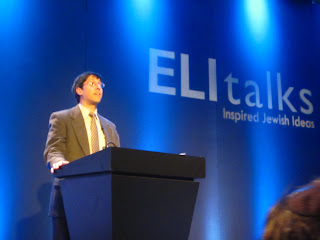
Allow presenter's “ideas loose in real and virtual landscapes,” is the premise behind the Eli talks according to Michael Berger of Avi Chai. Launched for the first time at this year's North American Jewish Day School Conference, approximately 100 audience members sat riveted as three presenters shared their insights.

Rabbi Michael Broyde, professor at Emory University, spoke about “Learning Law Young.” He took us through an exploration of the impact that teaching Jewish law in the younger years has upon our children. Broyde posed that learning to think about law changes the way one thinks about all areas of thought not just law. It teaches students how to resolve problems across disciplines and life in general. Broyde focused on methodological approaches learned through law such as how to think like a lawyer, analytic reasoning, obedience to law, and how to deal with competing approaches through compromise. By starting to teach Jewish law at a young age in Jewish Day Schools, our students have an advantage of being able to “Law Think.”
The next speaker, Dara Horn (an author), spoke of a children’s story which she used to read her child which transformed the way she understands the Jewish world and its thinking. “Doctor De Soto” by William Steig, helped Horn diagnose a Jewish problem. The problem, as she referred to it, is the “Eicha Problem,” one in which Jews have historically blamed themselves for all problems that befall them. In this model, the destruction of Zion was not a catastrophe but rather a tragedy, where the Jews self perception was that they had brought it upon themselves because of their own sins. The tendency of Jews, as Horn explains, is to believe that Anti-Semitism is our own fault. Why is it a responsibility for Jews to teach about Anti-Semitism, she poses. Shouldn’t non-Jews be responsible to educate against Anti-Semitism. Even with Israeli politics, Horn says regardless of which position we take, we blame ourselves. Terrorism either occurs because we are not being hard enough to crack down or because we are being too hard and this therefore causes more terrorism. Either way, we have framed the issue to be our fault. Horn suggests that we need a new theology where we stop blaming ourselves. Instead of running with the Eicha model where we constantly blame ourselves and our own action for our People’s suffering, we should go back to a Job model where we begin to realize how little we understand regarding cause and effect.
The final speaker was Rabbi Marc Baker, Head of Gann Academy, who spoke about "Jewish Educational Leadership with a Soul." He raised the question, why do we too often bifurcate "Jewish," "Educational," and "Leadership." Shouldn't each part help enhance and grow the others. Just as teaching is not just about what one teachers or how one teaches but also who that teacher is as a person, so too leadership is a profoundly moral and spiritual endeavor. Leadership is not just about the skills and capacities that one learns in a leadership training program. But rather, it is about leading from within. Baker questioned how intentional we are about allowing our Judaism to influence our leadership. In his school, he is implementing a program of religious purposefulness, not just with his students but with his whole school community. It is built upon three essential Mussar ideas: Middot - Inner Qualities/Soul Traits/Character Traits, Hitlamdut - reflective Practice (A Stance of Learning), and Bechira - Choice Points. If we want students to take on these values, first we need the adults to be on board. In this model, teachers are taking on the responsibility of their inner lives in order to become better teachers. When we focus on middot, it can inform how we approach problems that we encounter. Baker left us with the question, how do we reach "religiously purposeful leadership?" We need leaders who are willing to change themselves and are thereby, through their own self reflection, able to profoundly impact our world with Jewish values.

I certainly look forward to seeing future recordings of Eli talks and encourage everyone to check them out when they go live. It could be a great way to start one's day with a new thought provoking idea.

I also left so inspired and felt privileged to have been there. My mind was spinning with the ways we could use these talks!
ReplyDelete